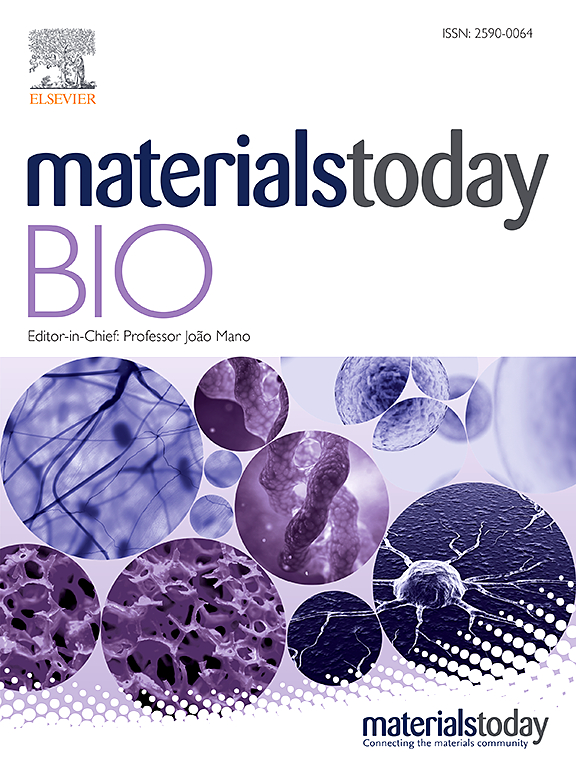Mn-MIL-100@AKG alleviates intervertebral disc degeneration by regulating mitophagy
IF 10.2
1区 医学
Q1 ENGINEERING, BIOMEDICAL
引用次数: 0
Abstract
Currently, the therapy of intervertebral disc degeneration (IDD) mostly focuses on basic molecular causes. Research on the alterations of metabolites in the intervertebral disc prior to and following intervertebral disc degeneration (IDD) remains inadequate, with even less therapeutic options available for metabolites. In contrast to traditional investigations of molecular mechanisms, it has been shown that a reciprocal relationship exists between the nutritional metabolism of the intervertebral disc and the molecular mechanisms of degeneration. Impaired energy metabolism in deteriorated nucleus pulposus cells exacerbates numerous degenerative phenotypes within the cells. This work investigated the metabolic alterations in the intervertebral disc after the creation of inflammatory degeneration models and illustrated the therapeutic benefits of α-ketoglutarate (AKG) on degenerated nucleus pulposus cells. This study introduces the first demonstration of a metal-organic framework (MOF)-based delivery system (Mn-MIL-100@AKG) for α-ketoglutarate (AKG) aimed at treating intervertebral disc degeneration (IDD), revealing a unique mode of mitophagy control through the HIF-1α-BNIP3-LC3B axis. Our study elucidated the critical function of autophagy regulation via the HIF-1α-BNIP3-LC3B axis in mitigating NPC degeneration and established a MOF-based AKG drug delivery system, offering a novel approach for the treatment of IDD.

Mn-MIL-100@AKG通过调节线粒体自噬减轻椎间盘退变
目前,椎间盘退变(IDD)的治疗主要集中在基本的分子原因上。关于椎间盘退变(IDD)前后椎间盘代谢物变化的研究仍然不足,代谢物的治疗选择甚至更少。与传统的分子机制研究相反,研究表明椎间盘的营养代谢与退变的分子机制之间存在相互关系。受损的髓核细胞的能量代谢加剧了细胞内的许多退行性表型。本研究研究了炎性退行性变模型建立后椎间盘的代谢变化,并阐明了α-酮戊二酸(AKG)对退行性髓核细胞的治疗作用。本研究首次展示了一种基于金属-有机框架(MOF)的α-酮戊二酸(AKG)递送系统(Mn-MIL-100@AKG),旨在治疗椎间盘退变(IDD),揭示了一种通过HIF-1α-BNIP3-LC3B轴控制线粒体自噬的独特模式。我们的研究阐明了HIF-1α-BNIP3-LC3B轴自噬调控在缓解NPC变性中的关键作用,并建立了基于mof的AKG给药系统,为IDD的治疗提供了一种新的途径。
本文章由计算机程序翻译,如有差异,请以英文原文为准。
求助全文
约1分钟内获得全文
求助全文
来源期刊

Materials Today Bio
Multiple-
CiteScore
8.30
自引率
4.90%
发文量
303
审稿时长
30 days
期刊介绍:
Materials Today Bio is a multidisciplinary journal that specializes in the intersection between biology and materials science, chemistry, physics, engineering, and medicine. It covers various aspects such as the design and assembly of new structures, their interaction with biological systems, functionalization, bioimaging, therapies, and diagnostics in healthcare. The journal aims to showcase the most significant advancements and discoveries in this field. As part of the Materials Today family, Materials Today Bio provides rigorous peer review, quick decision-making, and high visibility for authors. It is indexed in Scopus, PubMed Central, Emerging Sources, Citation Index (ESCI), and Directory of Open Access Journals (DOAJ).
 求助内容:
求助内容: 应助结果提醒方式:
应助结果提醒方式:


